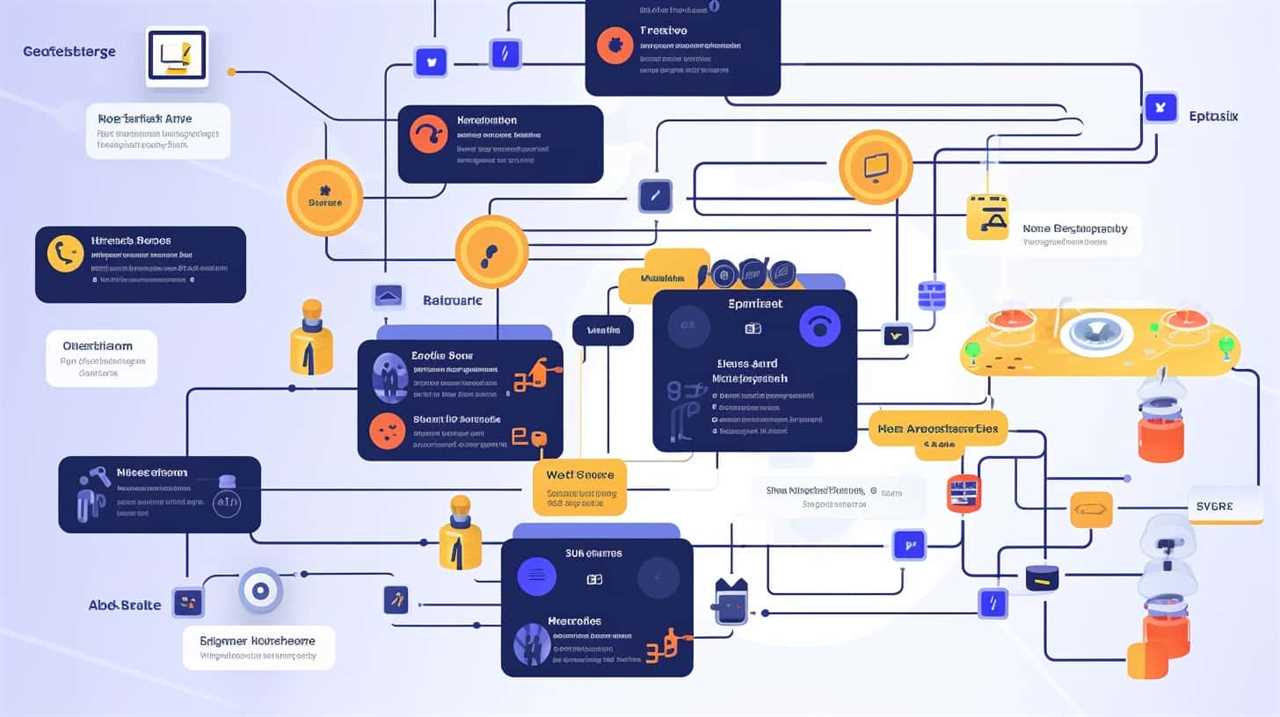Are you ready to unravel the secrets of SEO?
We’ve got you covered with this concise guide to SEO key terms.
From keyword research to on-page and off-page optimization, we’ll walk you through the essentials.
Get ready to dive into the world of SEO analytics and master the art of driving organic traffic to your website.

Let’s embark on this journey together and take your online presence to the next level.
Key Takeaways
- SEO is essential for improving website visibility and ranking on search engine results pages.
- Keyword research helps identify relevant and popular keywords to target.
- On-page optimization involves improving content structure and meta tags for better visibility.
- Off-page optimization includes link building, social media engagement, guest blogging, and online directory listings to increase website authority and drive targeted traffic.
What Is SEO
SEO, or search engine optimization, is the practice of improving a website’s visibility and ranking on search engine results pages. It’s crucial for businesses and website owners who want to increase their online presence and attract more organic traffic.
SEO techniques encompass various strategies, such as keyword research, on-page optimization, and link building. By implementing these techniques, websites can benefit from higher search engine rankings, increased website traffic, and improved user experience.
SEO benefits go beyond just visibility and traffic; it also helps in establishing brand credibility, generating leads, and increasing conversions.

With the ever-evolving nature of search engine algorithms, staying up-to-date with the latest SEO techniques is essential for maintaining a competitive edge in the online landscape.
Keyword Research
After understanding the importance of search engine optimization in improving website visibility and ranking, we can now delve into the crucial process of keyword research. This step is essential for identifying the right keywords that will attract the right audience to your website.
Here are five key points to consider during keyword research:
- Competitor analysis: Analyzing your competitors’ keywords can provide valuable insights and help you identify gaps and opportunities.
- Long tail keywords: These are specific, longer phrases that target a more niche audience and often have less competition.
- Search volume: Determine the popularity and demand of keywords by looking at the search volume data.
- Relevance: Choose keywords that are highly relevant to your content and reflect the intent of your target audience.
- User intent: Understand the search intent behind keywords to align your content with what users are looking for.
On-Page Optimization
Now let’s dive into the next step of optimizing our website for better visibility and attracting the right audience: on-page optimization.

On-page optimization refers to the process of optimizing the content structure and meta tags of our webpages to improve their visibility in search engine results.
One important aspect of on-page optimization is content structure, which involves organizing our website’s content in a logical and hierarchical manner. This helps search engines understand the relationships between different pages and the importance of each page within our website.
Another crucial aspect is meta tags optimization, where we optimize the meta title, meta description, and meta keywords of our webpages. By incorporating relevant keywords into these tags, we can improve our website’s relevance and visibility in search engine results.
Mastering on-page optimization is essential for maximizing our website’s potential and attracting the right audience.

Off-Page Optimization
Moving forward with our optimization process, let’s explore the next step: off-page optimization. This phase involves strategies that focus on improving your website’s visibility and reputation outside of its own pages. Here are five key elements to consider when implementing off-page optimization:
- Link building: Building high-quality backlinks from reputable websites improves your site’s authority and ranking.
- Social media presence: Engaging with your audience on social media platforms helps increase brand awareness and drive traffic to your website.
- Guest blogging: Publishing articles on other websites in your niche allows you to reach a wider audience and build valuable backlinks.
- Online directories: Listing your website in relevant online directories can increase your online visibility and drive targeted traffic.
- Influencer partnerships: Collaborating with influencers in your industry can help expand your reach and attract new audiences.
SEO Analytics
When it comes to analyzing the effectiveness of your SEO efforts, it’s important to utilize SEO analytics. SEO metrics and reporting play a crucial role in understanding the impact of your optimization strategies and making data-driven decisions.
By tracking key metrics such as organic traffic, keyword rankings, bounce rate, and conversion rate, you can gain valuable insights into the performance of your website and identify areas for improvement.
SEO analytics also help in measuring the return on investment (ROI) of your SEO campaigns and demonstrating the value of your efforts to stakeholders. With the help of comprehensive SEO reporting, you can showcase your achievements and monitor the progress of your SEO goals.

Frequently Asked Questions
How Long Does It Take to See Results From SEO Efforts?
It typically takes time to see results from SEO efforts. The SEO timeline varies depending on factors such as website age, competition, and the strategies implemented.
It’s important to remember that SEO is a long-term investment, and success can’t be achieved overnight.
To measure SEO success, you can track metrics like organic traffic, keyword rankings, and conversions.
Are There Any Risks or Penalties Associated With SEO Practices?
When it comes to SEO practices, there can be risks and penalties involved. It’s important to understand that not all SEO strategies are created equal and some can lead to negative consequences.

These risks can include getting penalized by search engines, such as Google, which can result in a significant drop in your website’s rankings. Therefore, it’s crucial to focus on SEO effectiveness and follow best practices to avoid any potential penalties and ensure long-term success.
Is It Necessary to Hire an SEO Agency or Consultant, or Can I Do It Myself?
We can definitely do SEO on a budget and take on the task ourselves. However, hiring an SEO agency or consultant can bring valuable expertise and save us time and effort.
If we choose the DIY route, we should familiarize ourselves with key SEO concepts and best practices. Some tips for DIY SEO include optimizing our website’s structure, creating high-quality content, and building quality backlinks.
With dedication and research, we can achieve SEO success without breaking the bank.

What Are the Most Common Mistakes to Avoid in Seo?
What are the most common mistakes to avoid in SEO?
When it comes to SEO best practices, there are a few errors we should steer clear of.
One common mistake is keyword stuffing, where we cram too many keywords into our content.
Another is neglecting to optimize our website’s loading speed, which can hurt our ranking.

Lastly, failing to create high-quality and relevant content can also hinder our SEO efforts.
It’s crucial to avoid these mistakes to achieve success in SEO.
How Does SEO Differ for Local Businesses Compared to Global Businesses?
When it comes to SEO, there’s a difference between local and global businesses. Local SEO focuses on optimizing for specific locations, while global SEO aims to reach a wider audience.
The importance of location in SEO can’t be overstated, as it impacts search results and user behavior. Understanding the nuances of local vs global SEO is crucial for businesses to effectively target their desired audience and maximize their online visibility.

Conclusion
So, there you have it – the wonderful world of SEO key terms. It’s like a magical language that helps your website climb the ranks of search engine results.
With keyword research, on-page optimization, off-page optimization, and SEO analytics, you’ll be able to conquer the digital realm and attract more traffic to your site.
It’s like a never-ending game of strategy and data analysis. So, buckle up and get ready to dive into the fascinating world of SEO!









